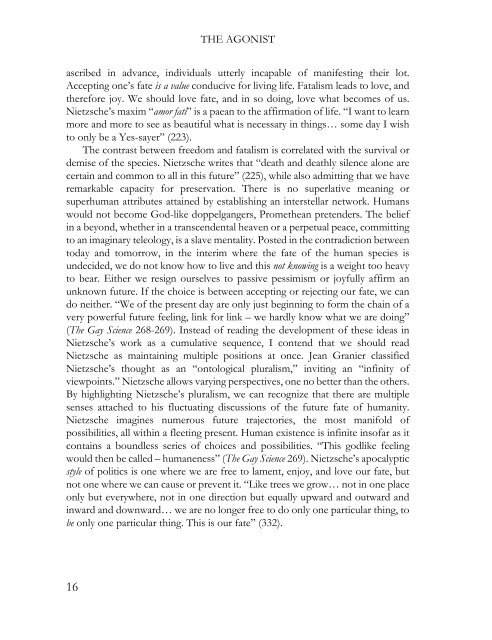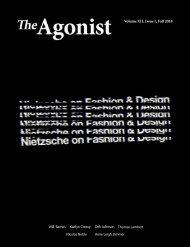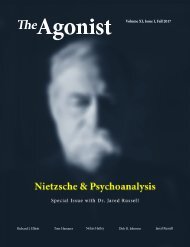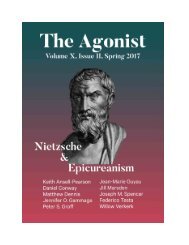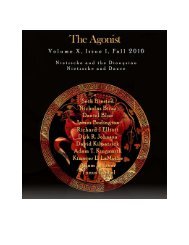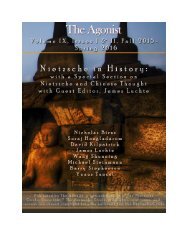Volume XII, Issue II, Spring 2019
Create successful ePaper yourself
Turn your PDF publications into a flip-book with our unique Google optimized e-Paper software.
THE AGONIST<br />
ascribed in advance, individuals utterly incapable of manifesting their lot.<br />
Accepting one’s fate is a value conducive for living life. Fatalism leads to love, and<br />
therefore joy. We should love fate, and in so doing, love what becomes of us.<br />
Nietzsche’s maxim “amor fati” is a paean to the affirmation of life. “I want to learn<br />
more and more to see as beautiful what is necessary in things… some day I wish<br />
to only be a Yes-sayer” (223).<br />
The contrast between freedom and fatalism is correlated with the survival or<br />
demise of the species. Nietzsche writes that “death and deathly silence alone are<br />
certain and common to all in this future” (225), while also admitting that we have<br />
remarkable capacity for preservation. There is no superlative meaning or<br />
superhuman attributes attained by establishing an interstellar network. Humans<br />
would not become God-like doppelgangers, Promethean pretenders. The belief<br />
in a beyond, whether in a transcendental heaven or a perpetual peace, committing<br />
to an imaginary teleology, is a slave mentality. Posted in the contradiction between<br />
today and tomorrow, in the interim where the fate of the human species is<br />
undecided, we do not know how to live and this not knowing is a weight too heavy<br />
to bear. Either we resign ourselves to passive pessimism or joyfully affirm an<br />
unknown future. If the choice is between accepting or rejecting our fate, we can<br />
do neither. “We of the present day are only just beginning to form the chain of a<br />
very powerful future feeling, link for link – we hardly know what we are doing”<br />
(The Gay Science 268-269). Instead of reading the development of these ideas in<br />
Nietzsche’s work as a cumulative sequence, I contend that we should read<br />
Nietzsche as maintaining multiple positions at once. Jean Granier classified<br />
Nietzsche’s thought as an “ontological pluralism,” inviting an “infinity of<br />
viewpoints.” Nietzsche allows varying perspectives, one no better than the others.<br />
By highlighting Nietzsche’s pluralism, we can recognize that there are multiple<br />
senses attached to his fluctuating discussions of the future fate of humanity.<br />
Nietzsche imagines numerous future trajectories, the most manifold of<br />
possibilities, all within a fleeting present. Human existence is infinite insofar as it<br />
contains a boundless series of choices and possibilities. “This godlike feeling<br />
would then be called – humaneness” (The Gay Science 269). Nietzsche’s apocalyptic<br />
style of politics is one where we are free to lament, enjoy, and love our fate, but<br />
not one where we can cause or prevent it. “Like trees we grow… not in one place<br />
only but everywhere, not in one direction but equally upward and outward and<br />
inward and downward… we are no longer free to do only one particular thing, to<br />
be only one particular thing. This is our fate” (332).<br />
16


